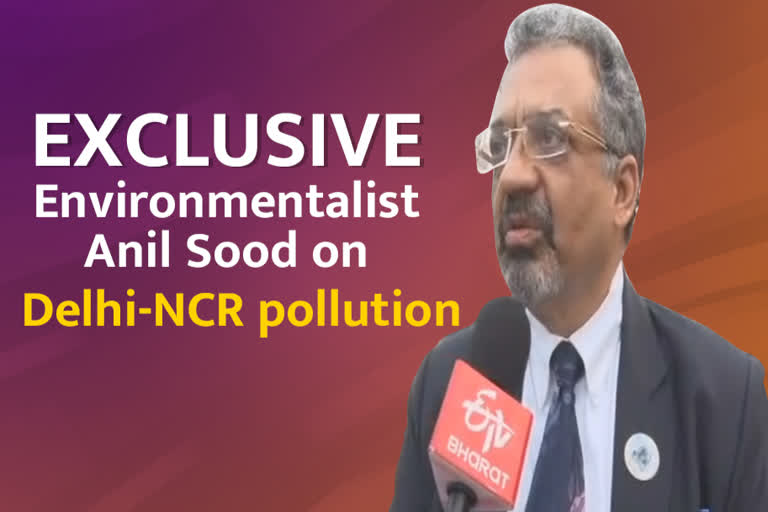New Delhi: With the Environment Pollution (Prevention and Control) Authority (EPCA) declaring a public health emergency in Delhi and National Capital Region, Anil Sood, a renowned environmentalist said that the pollution control authorities are not pollution emitted by aircraft and diesel locomotives in the region.
"This pollution is not just related to dust pollution or vehicular emission. Nobody assesses several other sources of pollution, neither the Central Pollution Control Board (CPCB) nor the Delhi Pollution Control Committee (DPCC). They have given in writing that they have not assessed pollutants emitted by aircraft and diesel locomotives. When we look at aviation, almost 2000 metric tonnes of CO2 is sprinkled on a daily by aircraft in the region, " said renowned Environmentalist Anil Sood, while speaking to ETV Bharat.
"This is a medical emergency, " he added.
Elaborating on the connection between the festival of Diwali and increasing pollution levels in the region, Sood said,
"After Deepawali, winter sets in, and a certain degree of moisture hangs in the air, it is because of this moisture that dust particles or suspended particles become heavy and remain suspended in the atmosphere. So, whatever CO2 is sprinkled over the city along with PM 2.5, PM 10 and other gases, they remain suspended in the air only."
On Delhi recording highest levels of pollution every winter, the environmentalist said, "Every city has its carrying capacity. It is only when you go beyond a city's ecological norms this kind of calamity occurs."
Also read: Passenger train coach derails at Nizamuddin station
An unprecedented public health emergency has been declared in Delhi and nearby areas by the pollution control body mandated by the Supreme Court, as the region has been trapped in a toxic smog since Diwali.
Schools in the capital have been asked to stop all outdoor activities and sports till November 5 to minimise exposure of children to pollution.
The Environment Pollution (Prevention and Control) Authority (EPCA) has also banned construction activity till November 5 as the pollution level in the region entered the "severe-plus" or "emergency" category late Thursday night, the first time since January.
The pollution authority has also banned the bursting of crackers during the winter season.



